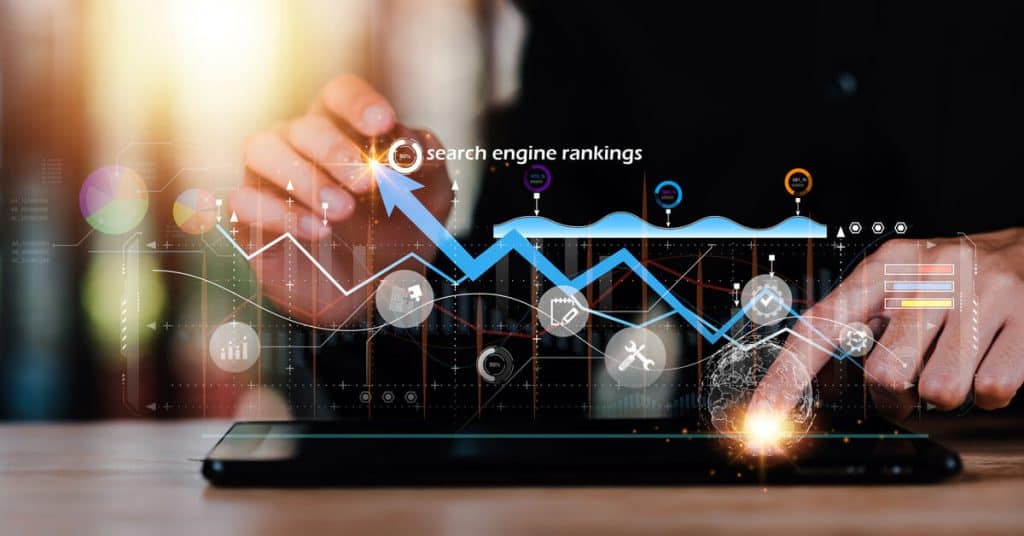Artificial intelligence (AI) has taken the world by storm, disrupting industries and revolutionizing the way we live, work, and interact with technology. One of the most notable examples of AI’s impact can be seen in the search engine and online advertising markets, where Google has long maintained a near-monopoly. However, as AI continues to evolve and competitors leverage its potential, Google may face significant challenges in maintaining its dominance.
We’re exploring the ways AI may disrupt Google’s market position and the strategies the company might adopt to secure its future as an industry leader.
Marketing & SEO: The Disruption of Google’s Dominance
AI has the potential to transform online marketing by delivering hyper-personalized content and ads based on user behavior, preferences, and context. As a result, Google’s traditional advertising model may become less effective, impacting the company’s revenue. Already, we have seen people migrating towards alternative search engines like Bing and AI-driven platforms such as ChatGPT.
Moreover, Google’s increasingly profit-driven approach and the moving of its “don’t be evil” and core value from the beginning of its company code of conduct and relegating it to a mere mention in the last line of that code have raised concerns among users, regulators and Google employees alike. This shift in public perception could further weaken their position in the market.
But Google’s last chapter has not been written. They will fight tooth and nail to hold onto their success.

Google’s Approach to AI: Evolving Strategies and User Concerns
Over the years, Google’s approach to AI has evolved significantly, with the company investing heavily in research and development. However, to remain competitive, Google needs to address user concerns about privacy and data protection and adapt its AI strategies accordingly.
Google rushed to release its AI system, Bard, after ChatGPT was released in order to show they can compete. As a result of their rushed release, Bard published incorrect information to the question, “What new discoveries from the James Webb space telescope (JWST) can I tell my nine-year old about?”
BARD responded in a video posted online that JWST took the first pictures of a planet outside Earth’s solar system, which was incorrect as the first image was taken by Chauvin with VLT/NACO using adaptive optics in 2004 over 15 years before the JWST even launched.
This was called out by Grant Tremblay, an astrophysicist at the US Center for Astrophysics, resulting in a 9% stock drop or more than $100 billion in value from Google’s parent company, Alphabet.
As Google works to reposition, competitors like Bing are taking advantage of their lead in publically revealed AI-driven search. To regain its footing, Google is banking on new AI-powered features like text-to-video. To the general public, Google’s new strategies, as revealed on CBS’s 60 Minutes (link to video), seem to follow the patterns of a moonshot, whereas Google could potentially beat ChatGPT and Bing to a later product and cede the position on the current status of AI. It remains to be seen if this will be successful.

Google’s Competitors: Emerging Threats and Industry Challenges
Emerging AI-driven technologies and companies pose significant threats to Google’s market position. Competitors are leveraging AI to challenge Google in various industries, including cloud computing and hardware development. AI-powered features and services could potentially replace some of Google’s core offerings, requiring the company to invest in AI research and development to maintain its market leadership.
Regulatory concerns surrounding AI and data privacy could also play a role in Google’s potential downfall. The potential to lose high-profile contracts, such as Samsung’s $3 billion deal and Apple’s $20 billion contract, further highlight the challenges faced by Google.
The Future of Google: AI Strategies and Opportunities
To mitigate the risks posed by AI-driven competitors, Google must focus on the following strategies:
- Prioritize user privacy and data protection, addressing concerns and rebuilding trust among users and regulators.
- Invest heavily in AI research and development to maintain a competitive edge and stay ahead of emerging technologies and competitors.
- Innovate with new AI-powered features and services that offer unique value propositions to consumers.
The future of search engines and digital marketing in an AI-driven world presents both challenges and opportunities for Google. The company’s proposed new model continues to change. Currently, it looks as if it will allow consumers to buy directly on Google based on their AI algorithm. This change potentially reduces data capture and the ability to cross-sell by suppliers, reduces opportunities for consumers to see other competing ads, and potentially increases the percentage of every user’s revenue to Google based on a single search inquiry. This gives rise to several interesting legal and ethical questions.
There has been a shift in recent years for Google, which controls 90% of all searches globally, to use its increasing monopoly to protect its market share using arguably anti-competitive practices. Moving forward, there will be more questions about the ethics and legality of Google’s monopolistic practices. “Don’t be evil,” indeed.
Google’s decisions and actions to stay relevant, the legal entities weighing in on AI technology, and consumers’ preferences and demands will influence the future of Google. Will this be their last chapter? We don’t think so, but we do see some major hits coming their way if they don’t step up their game.



